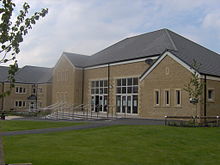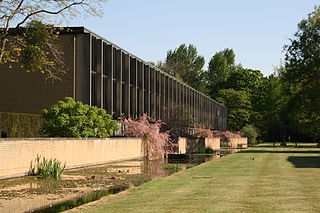
St Catherine's College is one of the constituent colleges of the University of Oxford. In 1974, it was also one of the first men's colleges to admit women. It has 528 undergraduate students, 385 graduate students and 37 visiting students as of December 2020, making it one of the largest colleges in either Oxford or Cambridge.
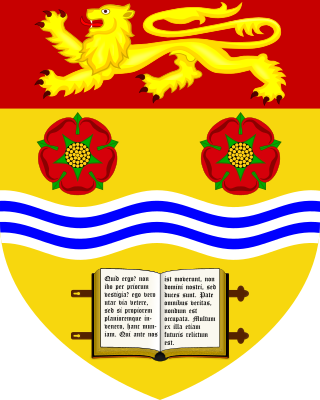
Lancaster University is a public research university in Lancaster, Lancashire, England. The university was established in 1964 by royal charter, as one of several new universities created in the 1960s.

Grizedale College is a college of the University of Lancaster in Lancashire, England. The college is named after the Grizedale Forest area of Lancashire North of the Sands. When it was built it was situated at the southern extremity of the Bailrigg campus. The development of the south west campus has meant that college is now considered to be one of the more centrally located colleges. It is currently the fifth largest in terms of number of students.

St Cuthbert's Society, colloquially known as Cuth's, is a college of Durham University. It was founded in 1888 for students who were not attached to the existing colleges. St Cuthbert's Society is a Bailey college, based on Durham's peninsula next to the River Wear, although it also has other accommodation a few minutes' walk away in Old Elvet.

St Aidan's College is a college of the University of Durham in England. It had its origins in 1895 as the association of women home students, formalised in 1947 as St Aidan's Society. In 1961, it became a full college of the university, and in 1964 moved to new modernist buildings on Elvet Hill designed by Sir Basil Spence.

John Snow College is a constituent college of Durham University. The college was founded in 2001 on the University's Queen's Campus in Stockton-on-Tees, before moving to Durham in 2018. The College takes its name from the nineteenth-century Yorkshire physician John Snow, one of the founders of modern epidemiology.

Vanbrugh College is one of the eleven colleges of the University of York.

Derwent College is a college of the University of York, and alongside Langwith College was one of the first two colleges to be opened following the university's inception. It is named after the local River Derwent. Both the original college building and the former Langwith college buildings are Grade II listed, making all of the current Derwent College premises Grade II listed.

Fylde College is a constituent college of the University of Lancaster, in Lancashire, England. The college was the sixth of the university’s colleges. Construction of the college buildings began in 1968 and the college began accepting students in 1969. The College officially opened in 1971. The college is named after the Fylde area of Lancashire.

Josephine Butler College is a constituent college of Durham University. The college was opened in 2006. It is named after Josephine Elizabeth Butler, a 19th-century feminist and social reformer who had a significant role in improving women's public health and education in England. Butler's father was the cousin of the 2nd Earl Grey, after whom Grey College, Durham is named.
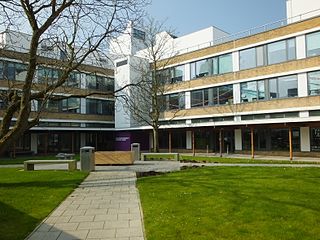
Bowland College is the oldest and fourth largest constituent college of Lancaster University. The college was named after the Forest of Bowland, to the east of Lancaster. Members of the college are informally referred to as Bowlanders.
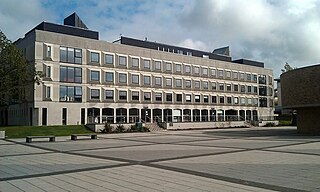
The County College, also known as County College or County, is a constituent college of the University of Lancaster. The establishment of the college was financed through the benefaction of Lancashire County Council and it is named after it. The original college building, County Main, was opened by HM The Queen in 1969.
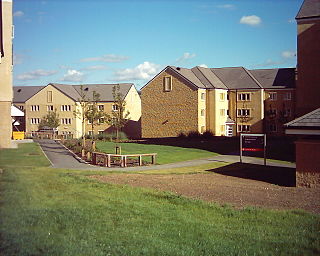
Cartmel College is a residential college of Lancaster University, England and was founded in 1968. It is named after the Cartmel Peninsula of "Lancashire north of the sands" which was once known as The Land of Cartmel. The college buildings were originally sited at the north end of the university's Bailrigg campus and extended in 1969. In 2004, the college was relocated around Barker House Farm in a new development in the southwest of the campus called Alexandra Park.

Pendle College is one of the constituent colleges of the University of Lancaster, England. Founded in 1974, the college is named after the Pendle witches of 1612, from the area around Pendle Hill in East Lancashire. The term "Pendle" is associated with a great deal of fantasy and legend.
St Martin's College was a British higher education college with campuses in Lancaster, Ambleside and Carlisle, as well as sites in Whitehaven, Barrow and London. It provided undergraduate and postgraduate courses in the arts, humanities, business studies, teacher training, health and social care. In 2006 the college was granted the power to award its own degrees. On 1 August 2007, the college merged with other institutions to form the University of Cumbria.
Colleges within universities in the United Kingdom can be divided into two broad categories: those in federal universities such as the University of London, which are primarily teaching institutions joined in a federation, and residential colleges in universities following the traditional collegiate pattern of Oxford and Cambridge, which may have academic responsibilities but are primarily residential and social. The legal status of colleges varies widely, both with regard to their corporate status and their status as educational bodies. London colleges are all considered 'recognised bodies' with the power to confer University of London degrees and, in many cases, their own degrees. Colleges of Oxford, Cambridge, Durham and the University of the Highlands and Islands (UHI) are 'listed bodies', as "bodies that appear to the Secretary of State to be constituent colleges, schools, halls or other institutions of a university". Colleges of the plate glass universities of Kent, Lancaster and York, along with those of the University of Roehampton and the University of the Arts London do not have this legal recognition. Colleges of Oxford, Cambridge, London, and UHI, and the "recognised colleges" and "licensed halls" of Durham, are separate corporations, while the colleges of other universities, the "maintained colleges" of Durham, and the "societies of the university" at Oxford are parts of their parent universities and do not have independent corporate existence.

A common room is a group into which students are organised in some universities, particularly in the United Kingdom, normally in a subdivision of the university such as a college or hall of residence, in addition to an institution-wide students' union. They represent their members within the hall or college, operate certain services within these institutions such as laundry or recreation, and provide opportunities for socialising. There are variations based on institutional tradition and needs, but classically the following common rooms will exist:

Furness College is the fifth college of the Lancaster University. Planning of the college started in 1966 when a 12-person planning committee chaired by Professor Reynolds was established to design the buildings and faculties of the college. The committee worked for two years and the college was officially opened in 1968. The main college building occupies a central location on the campus, being just to the south of Alexandra Square. The college's latest rejuvenation occurred in the 2011–2012 academic year, which included a substantial redevelopment of the building interior to accommodate both the college and the Faculty of Health and Medicine. The college is named after the Furness area, part of the Duchy of Lancaster and the historic county of Lancashire.
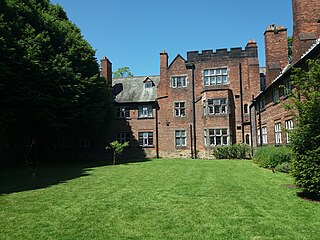
Hulme Hall is a traditional University of Manchester hall of residence situated at the Victoria Park Campus in Rusholme, Manchester, housing 300 students. It has a range of facilities including the John Hartshorne Centre: a 300 seat lecture theatre with attached seminar rooms; a library; Junior Common Room and study spaces; music room; old dining hall; the Victoria Park bar; and chapel.
The Lancaster University Students' Union (LUSU) is a students' union at Lancaster University in Lancashire, England. It is a registered company and charity overseen by a board of trustees. Politically, it is led by six sabbatical officers - a President and five Vice-Presidents - who are elected annually by the student membership.
